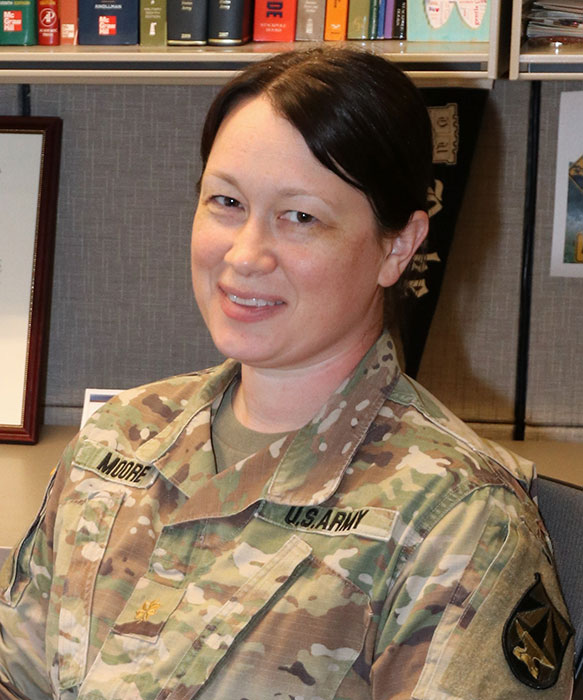USAMRICD's Moore selected as an Army Medical Department Iron Major

Maj. Nicole L. Moore, deputy chief of the Research, Development and Integration Office at the U.S. Army Medical Research and Development Command's (USAMRDC) U.S. Army Medical Research Institute of Chemical Defense (USAMRICD), has been selected as an Army Medical Department Iron Major. Moore was one of 46 AMEDD officers and civilians to be recognized for their outstanding leadership and mentoring skills as well as their demonstrated potential to positively impact the future direction of Army Medicine.
"I'm honored to have been selected," said Moore. "This is an incredibly competitive award due to the depth of talent among our majors in the Medical Service Corps. I'm looking forward to the opportunity to learn more about the rapid evolution of Army Medicine and how I can serve as a forward-looking leader in these times of change."
As an Iron Major, Moore will attend the Army Medicine's Iron Majors Week Post-Professional Short Course Program. The program seeks to further develop selectees' leadership potential by introducing them to various interagency activities as well as through their interaction with senior leaders, executives and subject matter experts from multiple fields. The experience and knowledge gained through the program will serve these future leaders as they take on issues and challenges within Army Medicine and the Joint Health Services Enterprise.
Moore, a research psychologist, was nominated for the Iron Major award by Lt. Col. Matthew Moser, who recently completed his tour as USAMRICD's deputy commander. Moser cited Moore's outstanding performance in a position designated for a lieutenant colonel and noted among her accomplishments her deft realignment of the scope of the USAMRICD's research program to focus on the needs of the future battlefield in multi-domain operations. According to Moser, Moore was adroit at developing relationships with new research programs, which facilitated expanding the reach of the Institute's core expertise in medical chemical defense.
Additionally, Moser noted that Moore fostered "a healthy and productive team culture by taking care of subordinates and contemporaries through challenging times," and that to accomplish the mission she promoted collaboration between the institute's scientific staff and its support personnel.
"Her demonstrated history of combining her cutting-edge scientific background, inclusive leadership in action, and an internal drive to use scientific knowledge to medically support her fellow Soldiers make her a unique and much needed asset in the Medical Service Corps' arsenal of talent in a rapidly changing environment," said Moser.
Moser concluded, "I know she will rapidly integrate the experiences and knowledge, and use them to better her profession and the people and organizations around her."
 An official website of the United States government
An official website of the United States government
 ) or https:// means you've safely connected to the .mil website. Share sensitive information only on official, secure websites.
) or https:// means you've safely connected to the .mil website. Share sensitive information only on official, secure websites.


